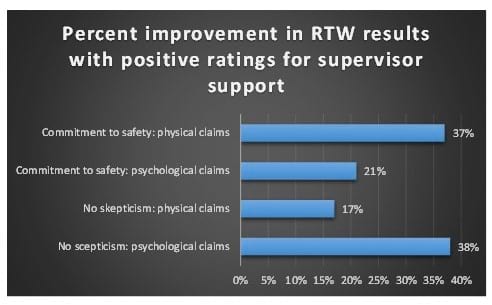Supportive supervisors see more RTW

Supervisors play a pivotal role in workplace safety and return to work. However, an analysis of data from the National Return to Work Survey 2013 and 2014 shows that injured workers don’t always perceive supervisors as sources of support. This is particularly true of workers who have made a claim for psychological injury.
Workers were asked whether, prior to injury, their immediate supervisor was committed to workplace safety. More than three quarters (77%) of workers with a physical injury gave their supervisor a positive rating in terms of workplace safety, compared to just a third (33%) of workers with a psychological injury.
Workers with a psychological injury were also less likely to feel supported by their supervisor post-injury, with more than half (59%) reporting that they felt their supervisor thought they were exaggerating their injury. Sceptical supervisors were reported by more than a third (37%) of workers claiming for a physical injury.
Regardless of whether the injury underlying the claim was physical or psychological, workers who gave supervisors positive ratings had better return to work outcomes than those who did not.
The table below sorts workers into groups according to type of injury (physical or psychological) and rating of supervisor support (positive or negative). The percentages relate to the proportion of workers from each group who were back at work at the time of the survey.
| Measure of supervisor support | Physical claims % at work | Psychological claims % at work | ||
| Positive response–Supervisor commitment to workplace safety | 81% | 59% | 62% | 49% |
| Positive response–Supervisor's beliefs about injury | 82% | 68% | 66% | 48% |
This data is important, so let’s break it down in another way:
- Workers with a psychological injury were 38% more likely to be back at work if they felt their supervisor acknowledged the validity of their injury (66% compared to 48%);
- Workers with a physical injury were 17% more likely to be back at work if they felt their supervisor acknowledged the validity of their injury (82% compared to 68%);
- Workers with a psychological injury were 21% more likely to be back at work if they felt that their immediate supervisor was committed to workplace safety before they were injured (62% compared to 49%); and
- Workers with a physical injury were 37% more likely to be back at work if they felt that their immediate supervisor had shown a commitment to workplace safety before they were injured (81% to 59%).
These improvements are illustrated in the chart below.

Workers’ perceptions of supervisor support are likely to be influenced by a number of factors, including individual state of mind, the broader workplace culture and the degree of warmth in the supervisor / worker relationship prior to injury. The extent to which a worker blames their supervisor for the injury they have sustained is also likely to affect perceptions of support.
However, the results summarised above support the idea that the actions of supervisors post-injury and post-claim also influence RTW results. In particular, when a supervisor is perceived to be sceptical of a worker’s injury, RTW will likely suffer. According to a 2010 report from the Workers’ Compensation Research Institute, workers are also more likely to hire a lawyer when they experience this lack of trust . Learn more about this phenomenon here.
We've also written an article with practical advice for supervisors who are suspicious about the legitimacy of a workers’ compensation claim.

